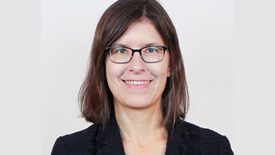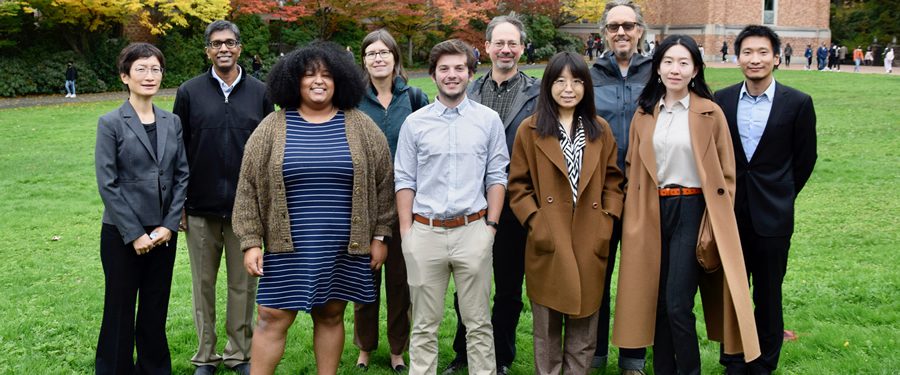UNC Charlotte researcher on team that receives $2M from NSF to design adaptable urban spaces

A team including UNC Charlotte urban planning researcher Katherine Idziorek has received a nearly $2 million grant from the National Science Foundation to advance research on how urban social and spatial systems can be organized to be more resilient and efficient.
The Leading Engineering for America’s Prosperity, Health and Infrastructure (LEAP-HI) project, led by the University of Washington (UW) College of Engineering, supports fundamental research to generate the knowledge, mechanisms and tools needed to design an adaptable society. Such a society, the project researchers said, can switch between different operating strategies depending on the situation, which might range from everyday life to a pandemic to a natural disaster. Ideally, people and cities in the future will be able to more efficiently adapt to system changes without undue hardship.
The four-year grant provides funding to researchers at the UW, Arizona State University, the University of Notre Dame and UNC Charlotte.
Idziorek, an assistant professor in UNC Charlotte’s Department of Geography and Earth Sciences, said, “Urban planners manage public space using a system of permits and other kinds of regulatory tools that can often be difficult and time-consuming to change, for example the regulation of public street spaces in the right-of-way.
“We would like to develop tools or frameworks to enable more flexible use of urban space — particularly during different kinds of disruptions,” she said. “We would like to anticipate scenarios like COVID-19 or other kinds of disasters and think about what kinds of tools we might be able to put in place to help communities more easily adapt to changing conditions. These tools would serve as a kind of contingency plan, enabling planners and other officials who are permitting and regulating the public realm to be more nimble when the need arises.”
The research team will advance knowledge at the intersection of different disciplinary areas including urban planning, controls and optimization, human behaviors and transportation systems analysis, said Cynthia Chen, a UW professor of civil and environmental engineering and the lead LEAP-HI researcher.
“This project aims to develop systematic ways to reconfigure urban spaces for a variety of uses,” Chen said. “It designs mechanisms that provide business owners and supporting infrastructure such as transit operators with a set of options and decision support tools capable of accounting for future uncertainties. We explicitly model how information flows through a system so that people can adapt well to external disruptions.”
Equally important, the project integrates people, businesses and transit into a network, thus enabling a better understanding of how society can adapt to different disruptions. Other LEAP-HI researchers are Ram Pendyala of ASU, Vijay Gupta of the University of Notre Dame, and Daniel Abramson, Chaoyue Zhao and Branden Born of the UW.
The project will involve two case studies that address the vibrancy of small- to mid-scale food systems in Seattle and Phoenix. These studies will focus on challenges encountered by marginalized communities that include disproportionately large shares of frontline workers in food establishments and public transit users.
Idziorek, who joined UNC Charlotte in August, completed doctoral studies at the UW in 2021 and lived in the Seattle region when the pandemic began. She saw first-hand the impact that temporary closures of farmers markets had on the food system and people there.
“Initially, the city halted the farmers’ markets because there was a lot of uncertainty about how to deal with the impacts of COVID-19, including how to regulate the markets,” she said. “That caused a loss of business for the farmers, and it also decreased access to fresh food for folks who might have had limited transportation options or who might not have wanted to go to a grocery store during the initial stages of the pandemic. It took nearly two months for the farmers markets to re-open. We hope to build on lessons learned from COVID-19 and other kinds of disruptions to avoid these kinds of conflicts, especially for lifeline systems like the food network.”
Applying these lessons in the future could allow communities to develop ways of operating based on different disruptive scenarios. Then, if something similar were to happen in the future, communities could be better prepared to shift modes more smoothly and minimize these kinds of disruptions, she said.
While the case studies will center on Seattle and Phoenix, the researchers will seek understanding that is relevant elsewhere, and they anticipate the work will find its way into classrooms and community discussions. “We need to look at some specific cases to really understand the intricate web of regulations and land uses that is affected when large-scale disruptions happen, and we’re hoping that the lessons learned from the case studies will be more broadly applicable to cities across the U.S.,” Idziorek said.
Idziorek will bring to the project her research abilities and her experience as an AICP-certified planner. Before turning to a full-time academic career, she had practiced for eight years as a professional urban designer in the greater Seattle region, where her work focused on multimodal transportation planning and long-range community visioning. She served as an affiliate faculty member of the UW’s Department of Urban Design and Planning and as a City of Seattle Planning Commissioner, working to bridge research and practice.
“Urban planners regularly work with people from a range of other disciplines and perspectives,” she said. “If we try to make changes in a silo, it’s not going to serve people well. We need to be collaborating with engineers, with business owners, with community members. That collaborative spirit is essential to effective urban planning and has always been a focus of my work – it’s just part of who I am.”
The interdisciplinary, community-centered approach of the Department of Geography and Earth Sciences, the College of Liberal Arts & Sciences and UNC Charlotte were strong factors in her decision to join the faculty here.
“I love that urban planning is housed within geography and earth sciences,” she said. “It’s a very multidisciplinary department, and there’s a lot of opportunity for interdisciplinary collaboration and research. The other key factor for me was UNC Charlotte’s focus on community engagement. As a practitioner and as a scholar, I have always been focused on community-engaged research and have been a community advocate myself. I look forward to working with the Charlotte Action Research Project in the Department of Geography and Earth Sciences, and I am excited to build relationships with community organizations in Charlotte as I continue to settle in.”